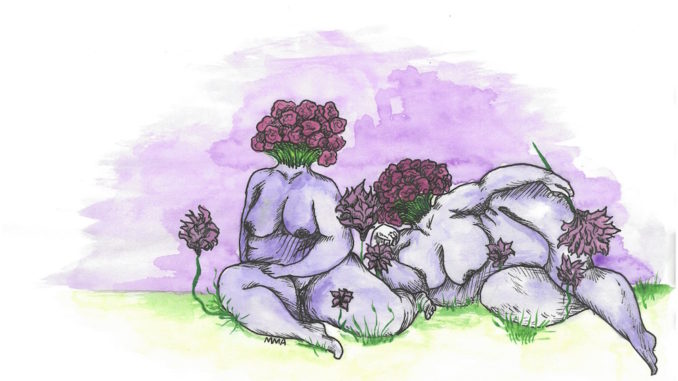
By Audrey Barrett
“The Bon desserts are my downfall!” “I worked out today so I deserve extra carbs.” “I’m being ‘good,’ I really shouldn’t eat that.”
Do any of these statements sound familiar? I hear family, friends and strangers say things like this all the time. Until recently, it did not seem wrong to me. But, these microinteractions serve to reinforce ideas that there is only one acceptable or attractive body type and that there are morally good and bad foods (which does not even make sense).
An Instagram account I follow posted an original comic that summed it up for me. One woman says, “I’m soooo bad for eating this cake!” The other woman says, “For f**k’s sake Sharon, you’re eating food, not burning down an orphanage!”
What we see in this comic is a representation of diet culture. Our society associates moral value with certain foods, behaviors and appearances; that is, a thin person who eats a lot of vegetables and hits the gym seven days a week is seen as more driven, successful, admirable, etc. A deeper desire to better oneself can be externalized into a never-ending quest for the “perfect body.” It is vital for students, and everyone, to dismantle these damaging stereotypes and stand against fat-shaming.
Of course, to an extent, exercising and eating healthier foods does increase length and quality of life. However, health is as much mental as it is physical and ultimately, how another person treats their body is a private matter; your judgment of their health may not actually be helpful.
This type of thinking, when combined with genetics and environment, is the root cause of many eating disorders. These toxic thoughts can fester in the background, chipping away at self-esteem and mental health. For some people, it can develop into an eating disorder, causing emotional trauma and potentially permanent bodily harm.
College students can be vulnerable, especially with the stress of being away from home, dealing with classes and managing a social life. At least 30 million people in the US suffer from an eating disorder; this group has the highest mortality rate of any mental illness. This is not limited to the skinny white girl stereotype. Eating disorders, or even just disordered eating patterns without a full diagnosis, affect men and women of all ages, backgrounds and body types. Let’s bust some myths right now: not everyone with an eating disorder is super skinny, and they are not romantically beautiful in their ascetic self-punishment. Moreover, people with eating disorders are not vainly chasing an attractive body; they are chasing the cultural value associated with thinness. At Lewis & Clark and elsewhere, a thin person is seen as in control, successful and attractive. Conversely, a fat person is seen as lazy, stupid, inept, etc. Obviously, the physical appearance of a person does not actually correlate with any of these character traits, but the societal pressures to think that way are oppressively present.
Since there is so much stigma and misunderstanding around this issue, many people will go through it in silence and without support The National Eating Disorders Association sponsors a week of awareness to call attention to both survivors and those who may still be struggling, encouraging people to share their stories and make others feel less alone. This year, the week spanned from Feb. 26 to March 4. It is likely that everyone reading this article knows someone (or is someone) who grapples with body image or food/exercise anxiety every day, but does not talk about it. I hope people can begin to recognize the influence of diet culture on their everyday lives at LC and challenge the stereotypes and stigma associated with such a prevalent mental health problem.
Final advice: Don’t be like Sharon. Call out the Sharons in your life when they say problematic things, just like you do when people speak carelessly about race, gender, sexuality, Donald Trump, you name it. We must all do what we can to correct this ignorance and societal conditioning. Let’s accept bodies for what they are: a vehicle for enjoyment of life, cake and the pursuit of happiness.
Subscribe to the Mossy Log Newsletter
Stay up to date with the goings-on at Lewis & Clark! Get the top stories or your favorite section delivered to your inbox whenever we release a new issue.

Leave a Reply